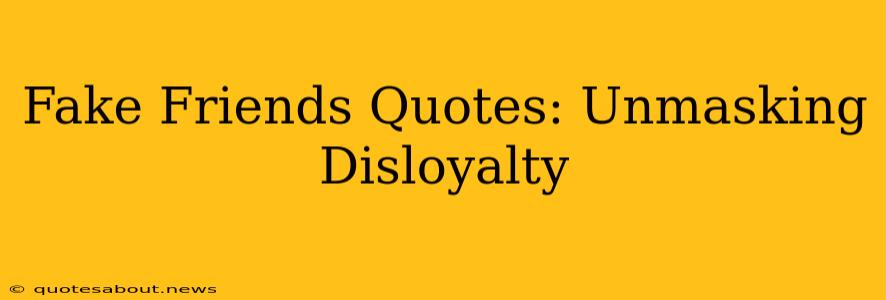Navigating the complexities of friendship can be challenging. While genuine friendships enrich our lives, encountering fake friends can leave us feeling hurt, betrayed, and questioning our judgment. This exploration delves into the pain of disloyalty, examines the telltale signs of fake friends, and offers insightful quotes to help you identify and navigate these difficult relationships. Understanding the nuances of these relationships empowers us to build stronger, more authentic connections in the future.
What are the signs of a fake friend?
Identifying fake friends often requires careful observation and self-reflection. They may exhibit behaviors that seem friendly on the surface but reveal a deeper lack of genuine care and support. Some key signs include:
-
Superficiality: Fake friends often prioritize appearances over substance. Their interactions may feel shallow, lacking meaningful connection or empathy. Conversations may revolve around trivial matters rather than deeper discussions about life, feelings, or experiences.
-
Inconsistency: Their behavior is often unpredictable and inconsistent. They may be overly friendly at times and distant or dismissive at others, depending on their own needs or social circumstances.
-
Jealousy and Competition: Fake friends might harbor hidden resentment towards your achievements or successes, subtly undermining your efforts or spreading negativity.
-
Backstabbing and Gossip: They may engage in gossip and spread rumors behind your back, showing a lack of respect for your trust and confidence.
How do you deal with fake friends?
Dealing with fake friends can be emotionally taxing. However, prioritizing your mental and emotional well-being is paramount. Here's a roadmap for navigating these relationships:
-
Recognize the behavior: The first step is acknowledging the signs of fake friendship and accepting that the relationship is not healthy.
-
Set boundaries: Start distancing yourself gradually. Limit your interactions and avoid sharing personal information that could be used against you.
-
Focus on your well-being: Prioritize self-care and invest time in building genuine relationships with people who appreciate and support you.
-
Consider a direct conversation (optional): In some cases, a direct conversation may be appropriate, particularly if the relationship has potential for repair. This is not always necessary or advisable, and your safety should always come first.
What are some insightful quotes about fake friends?
Quotes can capture the essence of complex emotions, offering both solace and clarity. Here are some insightful quotes on fake friends:
-
"A real friend is someone who walks in when the rest of the world walks out." – Walter Winchell. This highlights the unwavering support of a true friend.
-
"The best mirror is an old friend." – George Herbert. True friends offer honest reflections without judgment.
-
"A single sunbeam is enough to drive away many shadows." – St. Francis of Assisi. One genuine friend can counter the negativity of many fake ones.
-
"It is better to have four quarters than one hundred pennies." This proverb emphasizes the value of quality over quantity in friendships.
What are the differences between a real friend and a fake friend?
The difference between a real and fake friend boils down to authenticity and genuine care. Real friends:
- Offer unconditional support: They are there for you during both good times and bad, offering consistent encouragement and empathy.
- Respect your boundaries: They understand and respect your limits, never pressuring or manipulating you.
- Celebrate your successes: They genuinely rejoice in your achievements and support your aspirations.
- Engage in honest communication: They foster open and honest communication, addressing conflicts constructively.
How can I identify fake friends on social media?
Social media can be a breeding ground for superficial interactions. Look for these signs of fake friends online:
- Excessive flattery without substance: Over-the-top compliments without meaningful interaction.
- Selective engagement: Only interacting when they need something.
- Lack of genuine responses: Comments and messages lacking genuine interest or empathy.
Identifying and managing relationships with fake friends is crucial for personal well-being. Prioritizing authentic connections empowers you to cultivate friendships built on mutual respect, trust, and genuine care. Remember, quality over quantity is key when it comes to genuine connections.

